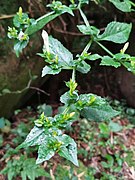Strobilanthes flexicaulis
Appearance
(Redirected from Strobilanthes glandulifera)
| Strobilanthes flexicaulis | |
|---|---|

| |
| Close-up of flower | |

| |
| Habit | |
| Scientific classification | |
| Kingdom: | Plantae |
| Clade: | Tracheophytes |
| Clade: | Angiosperms |
| Clade: | Eudicots |
| Clade: | Asterids |
| Order: | Lamiales |
| Family: | Acanthaceae |
| Genus: | Strobilanthes |
| Species: | S. flexicaulis
|
| Binomial name | |
| Strobilanthes flexicaulis | |
| Synonyms[1] | |
|
List
| |
Strobilanthes flexicaulis is a species of flowering plant in the family Acanthaceae, native to the Ryukyus and Taiwan.[1] A much-branched subshrub reaching 1 m (3 ft), it is found at elevations from 200 to 2,300 m (700 to 7,500 ft), typically beside streams in forests.[2]
Subtaxa
[edit]The following varieties are accepted:[1]
- Strobilanthes flexicaulis var. flexicaulis – Ryukyus, Taiwan
- Strobilanthes flexicaulis var. tashiroi (Hayata) T.Yamaz. – entire range
All Strobilanthes flexicaulis var. flexicaulis individuals simultaneously flower at six-year intervals, and then die, but S. f. var. tashiroi does not exhibit periodic mass flowering.[3]
References
[edit]- ^ a b c "Strobilanthes flexicaulis Hayata". Plants of the World Online. Royal Botanic Gardens, Kew. Retrieved 11 August 2023.
- ^ "曲茎兰嵌马蓝 qu jing lan qian ma lan". Flora of China. efloras.org. 2023. Retrieved 11 August 2023.
- ^ Kakishima, Satoshi; Yoshimura, Jin; Murata, Hiroko; Murata, Jin (2011). "6-Year Periodicity and Variable Synchronicity in a Mass-Flowering Plant". PLOS ONE. 6 (12): e28140. Bibcode:2011PLoSO...628140K. doi:10.1371/journal.pone.0028140. PMC 3233548. PMID 22163279.


